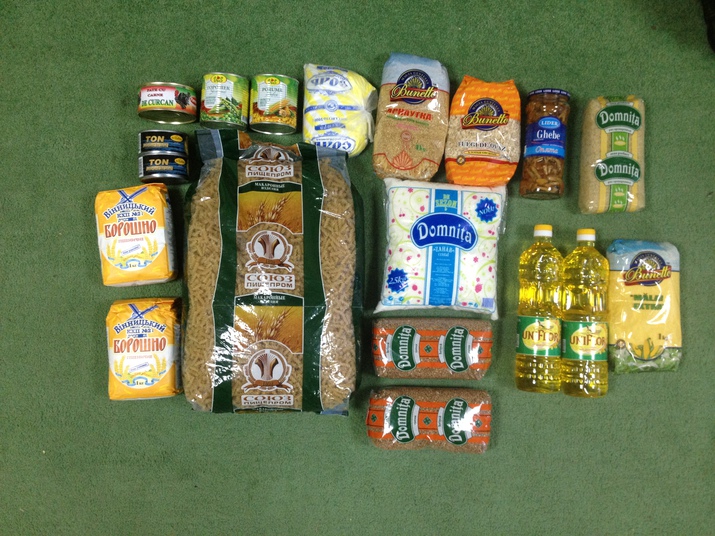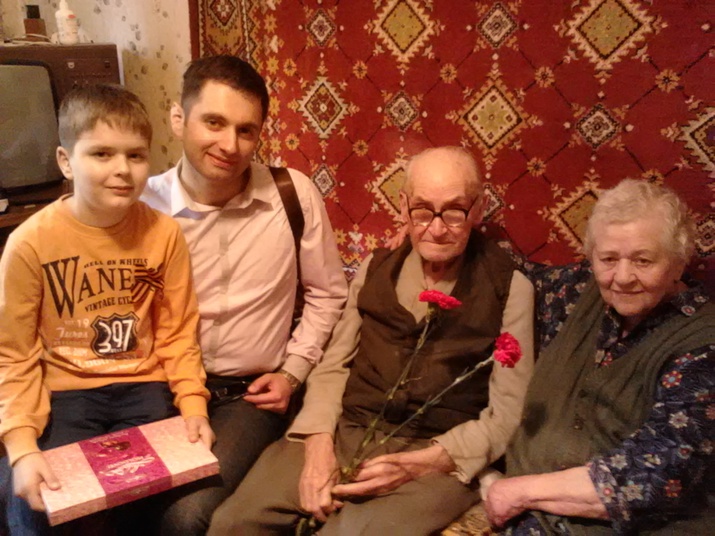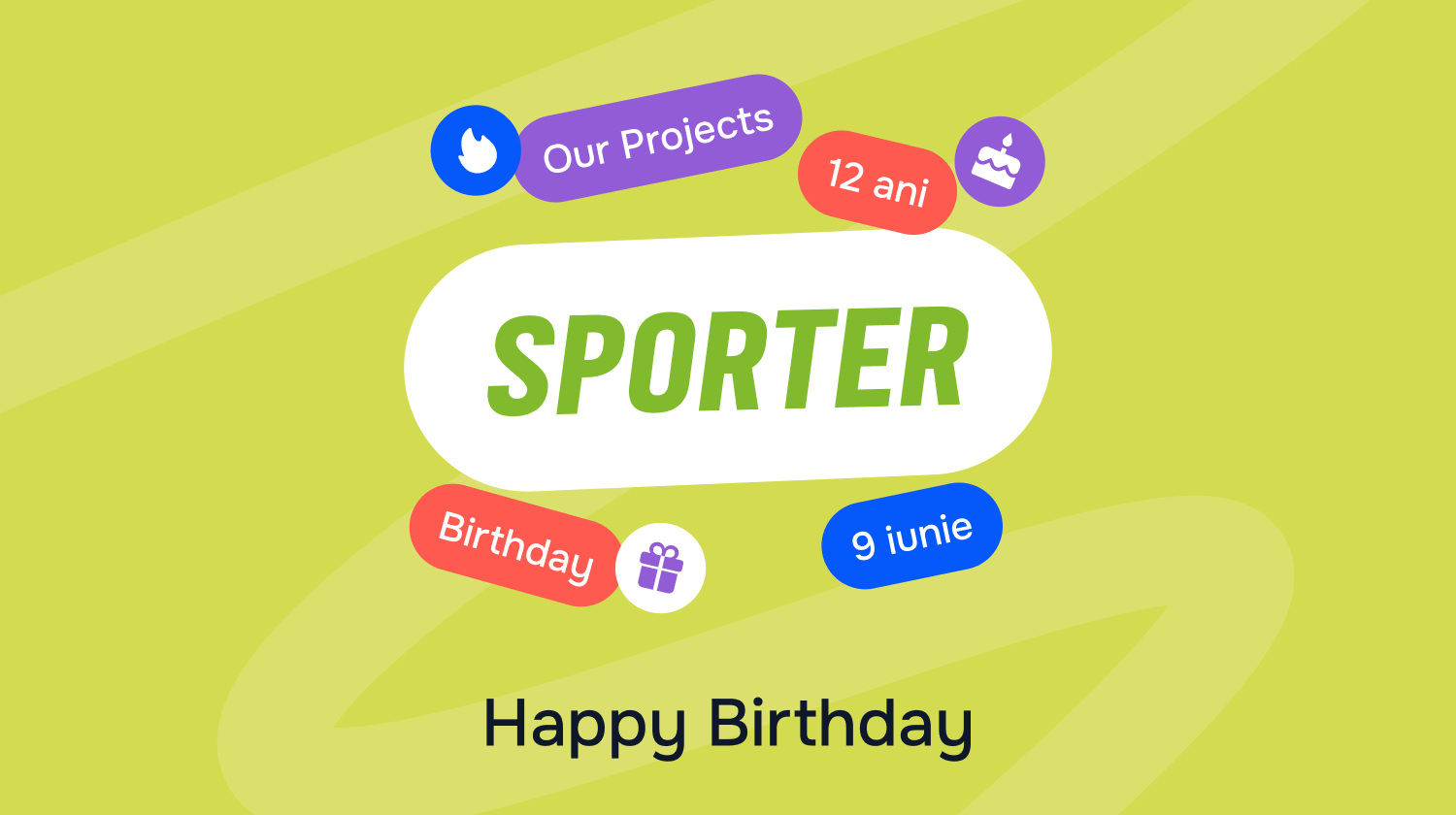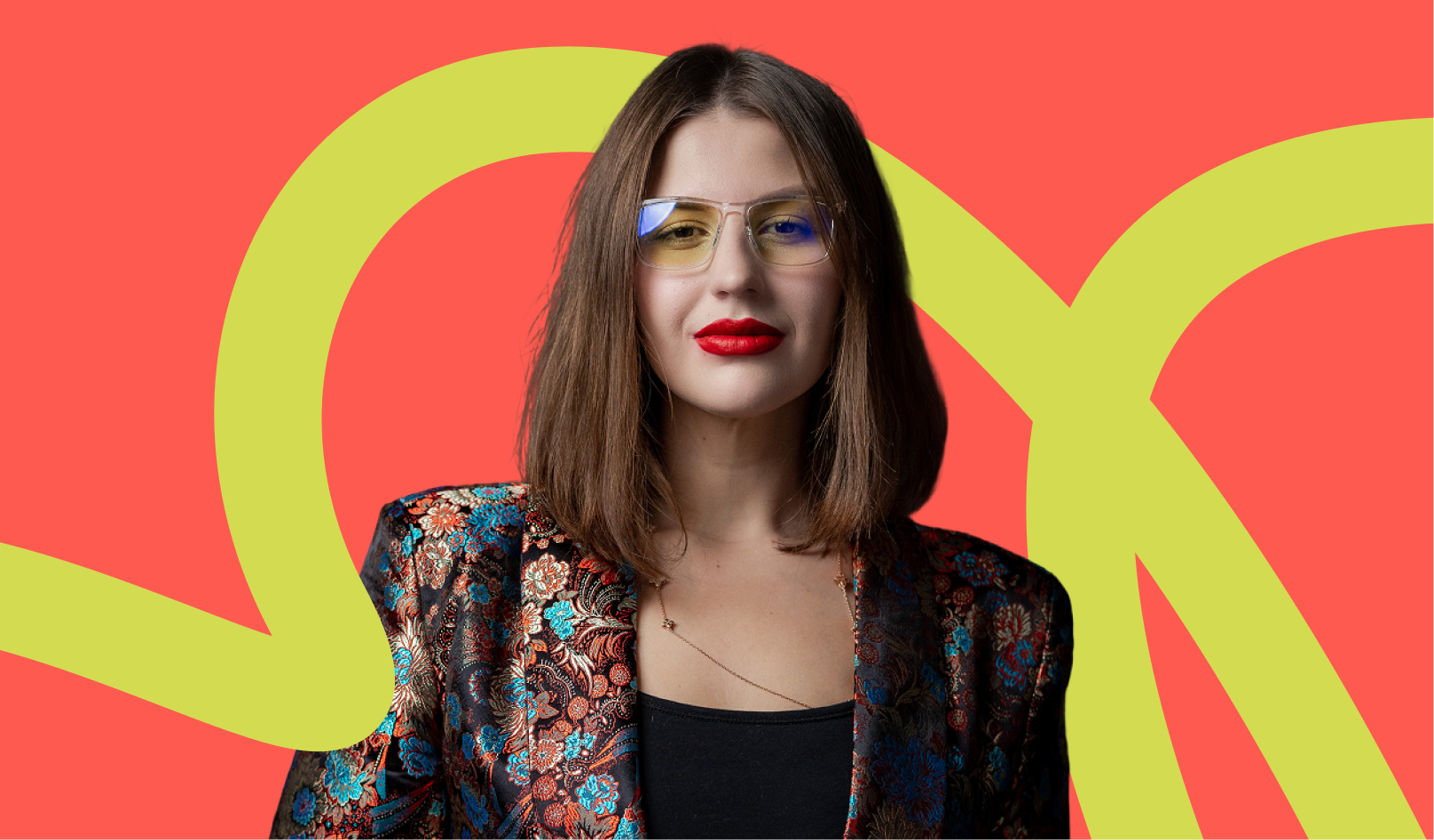This event is dedicated to the veterans of the Great Patriotic War, whom we should thank for the clear blue sky above our heads!..
We’d like to thank all those who responded to our call for the tenth time. And of course, many thanks to the new participants who joined us this year- if it weren’t for you, we wouldn’t be able to congratulate and thank 69 veterans!
Thanks to you, this event brings light and warmth into the hearts of our veterans! Thanks to you, we preserve the memory of our grandfathers and great-grandfathers, who defeated the fascist aggressors for the future of the generations to come.
This year we managed to set a record – we collected 40,646 lei in one month of the campaign!!!!! We had 18 teams that went to congratulate the veterans!!!
Each veteran received the following gift set:
Food products –
– Flour
– Green Peas
– Corn
– Pasta
– Tuna
– Sugar
– Buckwheat
– Vegetable oil
– Corn grits
– Rice
– Canned mushrooms
– “Arnautka” porridge
– Salt
– Pâté
Household chemicals –
– Detergent
– Washing Powder
– Liquid Soap
– Laundry Soap
Tea time treats –
– Tea – 2 types
– Juic- Sweets – chocolate sweets and caramel
– Marshmallow
– Biscuits with baked milk flavour
– Waffles
In total, we spent 33,138 lei on gifts, 840 lei on flowers and 75 lei on bags.
Since the gifts for the veterans were quite big, we decided to save the remaining 7,353 lei to make gifts for orphan children on the occasion of the “Children’s Day” on June 1st.
We would like to address special thanks to the users of the blog on mama.md- these girls always support us and this year was no exception !!! We’d also like to thank the company “Migheodan”, “Galexim Group”, the advertising agency Effect Media, participants and activists of the unique social project – the “Club of Young Businessmen”, our dear “old-timers” of the campaign who have been with us for several years, and new participants, who are always welcome!
And now we’d like to present our reports.
Departure from the office of the company Simpals:
The teams receive lists of addresses, products, have a briefing…
..and prepare their cars for the holiday! )
OUR VETERANS:
Barashin Viktor
Mechanic and driver of the tank. He was born in Russia. The war began for him in January 1943. He managed to return home only in 1951, having served for 7.5 years. Now he lives alone, his wife and daughter passed away.
Osmolovskaya Maria
Surgical nurse. She went to war at the age of 21, going all the way from Yaroslavl, through Czechoslovakia to Berlin. She is proud of her children- both her son anddaughter are Doctors of Medicine.
Medvedenko Maria
Surgical assistant. That’s all that we managed to find out about this veteran. She was in a very bad condition and could hardly stand, so we asked the guys to bring her gifts and leave after a while.
Sukhorukov Ivan
Colonel of tank troops in the armed forces of the Soviet Union. He was born on the 7th of November, 1926.
“In 1944, right after college, I voluntarily went to the front. I was sent to Hungary, to the third Ukranian front. My mother was very worried, because my father was killed on the front.
In January, we were walking down the road, hearing gunshots all around us, captured soldiers were walking along the roadside, broken tanks, cars and corpses lying on the ground… In three days we were ordered to take the high ground, no we had no tanks, no artillery ..People understood that they were sent to certain death, Our company commander was badly wounded. I crawled over to him, he was just a bloody mess. His pale lips whispered: “Bring me some water, son”. Then, I moistened his lips with snow. That was the last time I saw him.
The next day our tanks started firing at the Germans from the high ground. That was a different thing! I saw our enemies jump and run away…they had backpacks. Of course, they were prepared for war. They had lighters, and we like primitive people used stones to make a fire.
The most difficult day was February 17, 1945 in Hungary. The battles were going on. I felt something hit my thigh and fell down. It turned out that the bullet went right through it, and I couldn’t move…After that injury I was unable to return to the front. I was sent to the Kiev military school, where I celebrated the victory.
Donets Zoya
The woman no longer walks. In fact, we didn’t have a chance to talk to her as her daughter, grandson and friends came to visit her. So, we decided not to spoil the happy atmosphere in their family as well as their celebration.
Korovkina Ludmila
Health professional. 89 years old. She survived the Siege of Leningrad. She lives alone. We assumed that her children had forgotten her as she didn’t want to talk about her children. She lives in an apartment with very poor conditions, the faucets are leaking. She suffers from constant headaches and takes aspirin. She is funny and cheerful, but at the same time she is sad and depressed. It was obvious that she was a very strong-willed person, but a very vulnerable and unhappy one. She was very grateful to us and asked us to visit her again. When she was young, she liked travel. She is good at Geography and told us many things about China. She said that she often played cards. But as she didn’t know how to play the Fool card game, she often lost. “I can be three times a fool when I play, the main thing is not to be a fool in real life”. She talked a lot about the present life, that it’s completely different now and she wished that there were no wars. Then she forgot what she was talking about. She wanted to write a book, or maybe several books, because she had a lot to tell. She will be 90 in 2 months, but she thinks that she won’t live that long. So, we decided to assume tutelage over this woman and organize a good birthday party for her, so that she wouldn’t feel lonely.
Gumenyuk Klavdiya
She lives with her children. She met us with her son, who spoke warmly of his mother and father and led us into the room where we saw the portrait of his deceased father. Unfortunately, we couldn’t talk to the old lady.
Maklashevskaya Vera
This old lady is 92 years old. She lives with her children, grandchildren, great-grandchildren. She is in good health, Her family takes good care of her, they love and respect her. I was pleased to see how respectfully she was treated by her granddaughter. She was born in Russia and defended the eastern part of the city. Her husband was also a soldier, but he died. As the war began, she didn’t finish her studies, and she didn’t manage to complete them after the war. She has children, grandchildren, great-grandchildren! Until recently, she worked in a trade union. She was very surprised to see us and happily invited us into the house. Her battalion included 40 other young women.
Zlobin Alexander
Anikin Fyodor
He fought in the Far East, withstanding the attack of Japanese troops.
Kryuchkovich Grigory
He was born on the 10th of August, 1921 in Syzran (Samara Oblast, Russia). Some people ascribe him the invention of velour.
In 1938, he finished school. After that, he worked for a year and then entered the Moscow Institute of Law. In 1939, the first year students and graduates were called up for military service. In 1940. he graduated from the Artillery Academy in Kaluga in the rank of junior platoon commander. Until 1942 he undertook an internship in Ufa. When the war started, Grigory Abramovich was in Izhevsk, where he was appointed officer of a garrison. In July of the same year his father died. In January, he was transferred to the Leningrad front on Lake Ladoga, as part of the emergency brigade which had to neutralize unexploded ordnance.
1944- Grigory Abramovich was already on the Second Ukrainian Front. He is participant of the Iasi-Chisinau Operation. He reached Hungary. When the war ended, he was in Marasesti, Galati (Romania). He served in the army until 1968.
Slivka Valentina
She can’t leave the apartment as she has problems with her feet and can hardly walk. They greeted us very warmly and didn’t want to let us go!
She served in the military railway troops. They were rebuilding destroyed bridges and railways. She said that over 15 thousands bridges had been destroyed and they had to rebuild them under fire and bombardments, in heat and cold, in rain and snow, in mud and slush. They often had to evacuate people and hide in the forests from airstrikes. She began to serve as a soldier and finished the war with the rank of sergeant.
Evstifeeva Klavdiya
She participated in military operations at the Kursk Bulge. She was commander of a reconnaissance unit and an artillerist. After finishing the 10th grade at school, she voluntarily went to the front. She finished the war with the rank of sergeant.
Kolycheva Valentina
This year we visited her for the first time – we found out that this wonderful woman and veteran of the Great Patriotic War had never been congratulated and we went to her without any hesitation. When we came to visit Valentina Matveyevna, we were greeted very warmly- Valentina Matveevna didn’t hide the tears. As she said, she felt really bad until we came. After spending some time with us, she became very cheerful and didn’t want to let us go! She promised to celebrate with us the 70th anniversary of the Victory next year! The veteran’s best friend cheered her up holding her hand and told us her story.
She served as a radio operator. She is from Ivanovo. When she received a summons, she was only 18, but she went to the front without thinking. She survived the war and reached Berlin. After that she returned home.
Kalacheva Anna
She was born in Peschanka, Ilovlinsky District, Volgograd region in 1917. She had no family. She didn’t know her father, she was orphaned not long after her birth. Devastation was all around as well as raging fever and war. Her mother died when she was only three months.She doesn’t know much about her. But, apparently, she looks like her, because one day she heard people from the neighboring village say: “Oh, look, Anya is as beautiful as Pelageya”. She was raised by her mother’s brother until she was 11. He loved her and treated her as his own daughter. He had three horses, three cows, earned enough, but he still wore old pants. And when people said to him: “Yegor Ivanovich, buy yourself a pair of new pants!”, he replied: “No, we must first give education to Anna”. But when she was 11, her uncle was herding cows, he had a heart attack and died. After that, her cousin and her husband came to live at her place. They even gave her their last name, but she had a hard life with them as they were strange people to her. She was a Komsomol activist and a parachutist. Even before the war, she went to the flying club and made one jump. So she was a parachutist during the war and had to jump in the German’s rear, but she had no fear, because the war was so cruel and so many people died, that she had no time to think about herself. She understood that it was dangerous, but there was no time to be afraid.
Cazacu Elena
She got to the front, when a military field hospital was passing through Moldova. They came to our place and said that they needed doctors who spoke Romanian and Hungarian. So she decided to go. Her brother went to the front earlier and she was constantly looking for him among wounded soldiers being afraid to lose him. She was a nurse and managed to reach Berlin. She used to go to the memorial, but now she can’t do it as she is 90. As she said, after so many years she remembers every little thing about war. Elena Tikhonovna has children and grandchildren, they all live abroad.
Taran Mihail
He was a mortar gunner. He is very active and vigorous for his age. He was extremely happy to see us and promised to be in good shape at the 70th anniversary of the Victory.
Sidorenko Lyubov
The veteran was about to go to the memorial. Her caring grandson helped her to get ready and get into the car, and they were almost ready to leave, when we came. We did not have time to talk to the veteran – the main thing is that we managed to congratulate her and thank for the clear blue sky above about heads.
Dyakov Vasily
Unfortunately, information is not yet available.
Voronova Sussana
She is 90. She served as a nurse on the front since she was 18. When they came to her, she did not get up from the bed as she had walking difficulties like many people her age. We decided not to stay long and just congratulated her. We were pleased to see a great number of children’s cards with congratulations hanging over her bed.
Golovey Alexandra
The fragile, pretty, blue-eyed girl with a waist-length braid, who comes from the village of Annino (Saratov region) wanted to dedicate his life to the education of children. So, in June 21, 1941 she graduated from the Teacher Training College. It seemed that her dream fulfilled and soon she would become a teacher. But the morning of June 22 crossed out all the plans. The war broke out. She had to do a lot of things. At the beginning of the war, together with civilians she dug anti-tank trenches, performed the tasks of the National Department of Education. Then, in 1942, she was sent to Signal Corps. And then there were bloody battles, harsh military roads of the Caucasus, Ukraine, Moldova …Alexandra courageously survived and received the Order of the “Great Patriotic War” of the 2nd degree, medals “For Military Merit”, “For the Liberation of the Caucasus”, “For the Liberation of Ukraine”, “For Victory over Germany”.
By the way, Alexandra gave us a certificate of gratitude! This is the best reward!
Basalin Viatcheslav
I was born in July 25, 1925 in Astrakhan. My father was a sailor and my mother was a housewife. They had two children, me and my older brother Pavel. We lived very, very modestly. We had our own little house, which was not far from a big market. My friends and I were going to participate in the regional competition in Stalingrad, so on June 22 we gathered in the Karl Marx park to get instructions. We waited for that trip in great anticipation. But suddenly, the manager of the Karl Marx theater went to the stage and announced that the war began. At first, we experienced a bitter disappointment not because of the war, but because of the fact that the trip was canceled. But after a while, we all had that feeling “Hitler, hold on!” If you just could imagine, what was happening in the military enlistment offices. Everyone wanted to go to the front. We were sure that together we could defeat the Germans at once, but it didn’t go that way. From the first day on the front and up to the Victory I served as a radio operator. I was taught how to use the station right at the battery, but sometimes I had to take the coils to the front line. I remember, in Falenica, the suburb of Warsaw, we captured the German’s fortified post and I was ordered to connect the headquarters of our division with the observation point of the front headquarters. It was the time when I had a chance to see the commander Rokossovsky. I stretched about 10 coils of cable, 500 meters each. But when I started checking, there was no signal. I was so resentful that I started crying: “How could this happen? I will be shot for my failure to establish the connection”. An old man was standing next to me, who was also a signalman, told me: “Pee on the cable”. I did it and the connection was established as it was the sandy soil that caused problems with grounding”.
This is a wonderful letter that we received from one of our participants, Zelenko Ludmila. She and her friends congratulated the veterans: Fadeeva Pelageya, Belskaya Lidiya, Taran Mihail. You can find the print screen of the letter below.
The guys from the Club of Young Businessmen prepared a detailed report about the veterans they managed to visit and the things they need.
Berdina Nina
She is 92. During the Great Patriotic War she served as a medical assistant in a Ukrainian hospital, and during the liberation of Chisinau, she served as a nurse in a local hospital.
Now she is blind and lives alone. Only her neighbor helps her. When we asked the veteran how we could help her, she just said: “Come to visit me again, we’ll drink tea and talk, because I feel very lonely”.
Libenko Ninel.
She is 88. This is a woman with a remarkably strong spirit. She was a worker on the home front. She worked at an armament factory, which produced anti-personnel and anti-tank mines, grenades. They worked with radioactive elements, They were extremely hungry, worked for several days in a row, slept on sheets of cardboard on the cement floor.
The woman is very cheerful and polite. As she said, she doesn’t need anything special and she copes with everything. She’d be grateful if we could help her with medications.
Dzyubenko Olga
She will turn 90 on July 15th. Knowing about our visit, she put on all her medals for the first time in a long time (the last few years she couldn’t go to the memorial because of poor health).
She started to participate in military actions on June 23, 1941. On the second day of the war she started to work as a nurse. In the hospital she met her future husband, who had a bullet wound.
Dankova Vera, 88 years old.
She practically doesn’t speak and can’t walk unaided. During the war, she was a cook in a messing facility, where soldiers and wounded people received food.
She needs medications and food.
Getalov Alexander
He is energetic and cheerful. He told us many stories about war. His relatives help him. He needs more attention rather than financial assistance.
Yuzovchak Boris
He lives with his wife. They live in very poor conditions, so they would accept any financial assistance or help around the house.
Zemlyakov Viktor
He can’t walk and doesn’t feel well. His wife didn’t really want to let us in. She said that he got easily upset and started to cry, and it’s difficult to calm him down. She could hardly walk as well. We didn’t make any pictures. We think that any kind of help will be useful.
Bibilov Graf
He celebrated the holiday with his family. They were very hospitable.
Josan Georgy
She can’t hear and see, and needs help. The apartment is very dirty, there are no glasses in the windows, everything is covered in cobwebs.
Zinakova Lyubov
She is paralyzed. Her daughter takes care of her. We can help her with medications and diapers.
Danich Semyon
He felt a little unwell. His daughter takes care of him. He writes articles and is quite active.
Zhurkina Matilda
She died. We gave the products to her family as they have a small child and live very poorly.
Bogdanov Andrey
He is 91, he lives alone, he is a disabled veteran. He is blind and can’t hear, but he can walk a little. He needs everything: food, metications, etc.
Vieru Praskovja and Ivan Mihailovich(90 years)- the second photo with medals and in bed. Ye has children and grandchildren, who help him.
Babkuta Alexandra
This year she turns 90. She lives with her daughter and granddaughter, who help her.
Gavrilenko Vera
Grechko Lyubov
Shcherbakov Boris
Ovchinnikov Ivan
Morozov Viktor
We were informed about Viktor Morozov shortly before the start of the campaign. We were told that he didn’t need gifts, but he needed medications as he can’t afford to buy them. We gave his contact information to an active girl named Sabrina, who went to congratulate him. It turned out, that the veteran lives very poorly and doesn’t even have a refrigerator. Then the activists joined their efforts and found a refrigerator for Viktor Morozov as well as money for the purchase of the most necessary things. Thank you, guys!
Dubrov Vsevolod
He was born on August 30, 1926. He went to the front in 1944. He is participant of Iasi-Chisinau Operation, where he was wounded in the leg. After that, he was discharged. He has been living in Chisinau since 1970.
Fadeeva Pelageya
She was born on February 27, 1922. During the war she worked in the Moscow underground, where old people, women and children were hiding. She sawed forests near Moscow, dug anti-tank ditches, worked at a factory where she was filling anti-tank grenades, which was very harmful for health. In January 1943, she went to the front. She served with the rank of sergeant in the first Ukrainian front, 30th Army, 272nd Pavlograd Order of Suvorov Rifle Division.
Bezhenko Mikhail
He was born on August 22, 1920. He participated in the military action from the first days. In 1942 he spent 8 month in a cast- he had a contusion and fracture of the rib cage and spine. Serving in non-combatant corps, he survived the war. He has been living in Chisinau for 57 years. He worked at the Chekhov Russian Drama Theater where he played more than 200 roles.
Cheprasova Nina
She was born on February 24, 1924. She was on the front from December 2, 1942 to December 1944 as a pointer of the 85 millimeter anti-aircraft gun in the 1423 Anti-Aircraft Artillery Regiment. In December 1944, she had a contusion, after which she was evacuated to Baku for treatment.
Kovalenko Vasily
He was born on January 5, 1925. He served in the second Ukranian Front, guerrilla unit named after S. Lazo, participated in the Iasi-Chisinau Operation. In 1944, he had a contusion. He was sent for political work to Chisinau, then in the Arctic, after that back to Chisinau.
And finally, the video about our campaign on Mir 24 television channel.




























































































